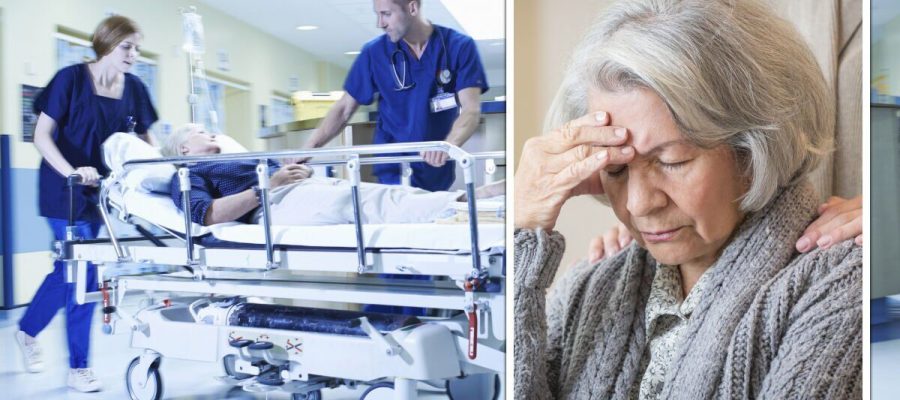
We use your sign-up to provide content in ways you’ve consented to and to improve our understanding of you. This may include adverts from us and 3rd parties based on our understanding. You can unsubscribe at any time. More info
Almost half – 49 per cent – of all people arriving at A&E departments by ambulance are aged over 65 and 35 per cent are older than 75. But Age UK says the number of elderly people living alone and struggling to cope with health problems on their own is soaring. And, without a proper social care safety net, the number of unplanned hospital admissions will continue to rise – piling yet more huge pressures on the NHS.
Figures show 3.3 million pensioners now live alone, up from 2.8 million a decade ago. And 1.5 million do not have children, so may need carers to help them at home.
Those numbers are expected to rise along with the demand on social care. But Age UK’s report, Fixing the Foundations, says politicians are not planning ahead.
It found the proportion of older people receiving long-term support from their local authority fell by 13.5 percent in the last five years.
Meanwhile, more than 1.6 million pensioners have some level of basic need – such as help with dressing, washing or getting out of bed – that is not being fully met.
They are also suffering from health conditions like heart disease, arthritis or diabetes, which they find increasingly difficult to manage. And many end up in hospital.
Caroline Abrahams, charity director at Age UK, said: “Last week we were contacted by a woman whose ageing father had died while sitting alone in a chair in the emergency department of his local hospital.
“The fact remains far too many older people are ending up in hospital…because we are failing to provide joined up, preventive health and care services to help them manage at home.
Too many are also getting stuck in hospital because there’s no social care to support them at home.
“It’s an entirely predictable vicious circle that’s causing enormous heartache and distress for our older population. And huge difficulties for the NHS, too.”
Age UK found more than two-thirds of people aged over 85 are living with multiple health conditions and 35 per cent of the elderly are have some form of frailty.
Report co-author Ruthe Isden said: “A growing older population, living longer, with increasingly complex needs and many without children to provide informal care, means there is not a safety net in quite the same way as there has been in the past.
“We see older people and their families increasingly struggling and suffering.”
‘We were left to struggle alone’
Norman and Rosamund Phillips battle multiple health conditions and have always fought to stay at home to do so.
But they were forced to call 999 for an ambulance after feeling they had been left to deal with a medical emergency alone.
Mrs Phillips, 72, has multiple sclerosis and dementia, and Mr Phillips, 71, a former IT manager, gave up work in 2008 to be his wife’s carer when help was too expensive. The couple, from Stevenage, Herts, have been married for more than 40 years.
On January 27 Mrs Phillips became seriously unwell and her husband called 999 after they could not get a GP visit and the district nurse said she could not treat Mrs Phillips without a doctor’s consent.
Mr Phillips said: “After a week of increasing pain and approaching the GP several times, and the district nurse, and dialling 111, which never returned calls, I was forced to call the emergency number.”
In hospital they found his wife was on the verge of suffering a perforated bowel.
“The system is a joke,” he said. “There’s no joined-up thinking. Older people are left to struggle alone and the situation is made harder because health professionals no longer seem to want to leave their offices.”
Source: Read Full Article
